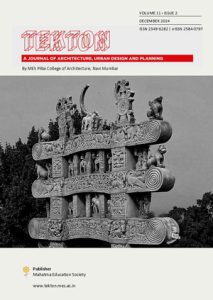Lili Boenigk
Tekton
Tekton: Volume 11, Issue 2, December 2024
pp. 08 – 23
 Lili Boenigk is a graduate student in the department of Building Technology at MIT. Her research explores the way in which social networks intertwine with material culture to facilitate material reuse and build collective material imaginaries. She is also interested in how care labor and maintenance regimes inform changes in the built environment.
Lili Boenigk is a graduate student in the department of Building Technology at MIT. Her research explores the way in which social networks intertwine with material culture to facilitate material reuse and build collective material imaginaries. She is also interested in how care labor and maintenance regimes inform changes in the built environment.
lboenigk@mit.edu
ABSTRACT
Golconde is often described as India’s first Modernist building. Completed in 1945 in Pondicherry, a French-governed enclave in southern India, the building serves as a dormitory for members of the Sri Aurobindo Ashram. This article explores the role of Golconde’s longtime building manager, Mona Pinto, who is largely responsible for the structure’s remarkable preservation. Mona’s contributions to Golconde’s creation and maintenance challenge conventional, temporally static understandings of the building object. Pinto’s positionality also allowed her to mediate philosophical and secular understandings of space at the ashram. Though actors like Pinto enable the physical and social functionality of structures through practices of care, architectural authorship is traditionally awarded solely to the singular “designer.” By leveraging conceptions of architecture as process and frameworks of emotional labor, this article aims to valorize acts of architectural creation performed by actors like Pinto after the completion of the building object.
KEY WORDS
Auroville, Authorship, Golconde, Maintenance, Mona Pinto


